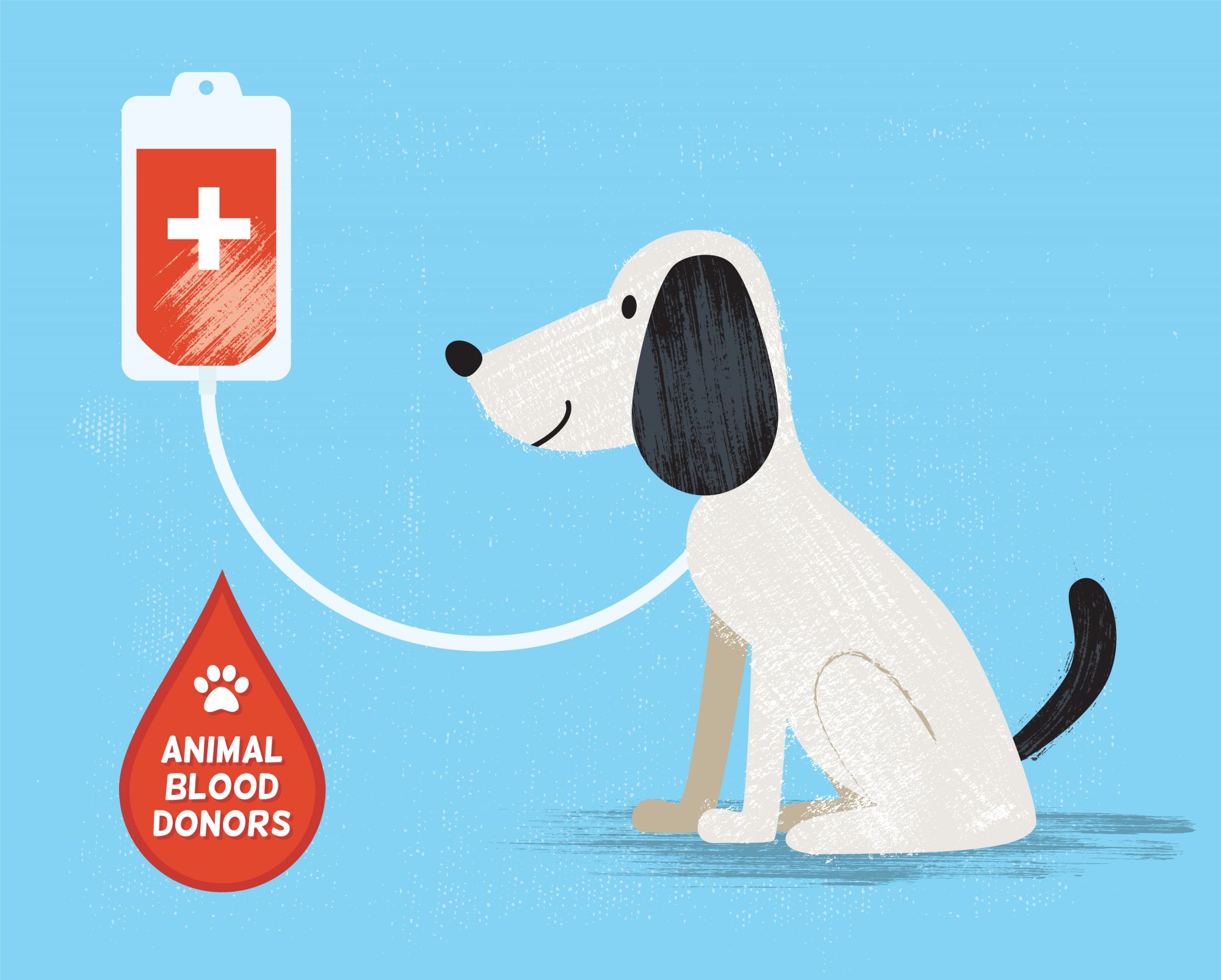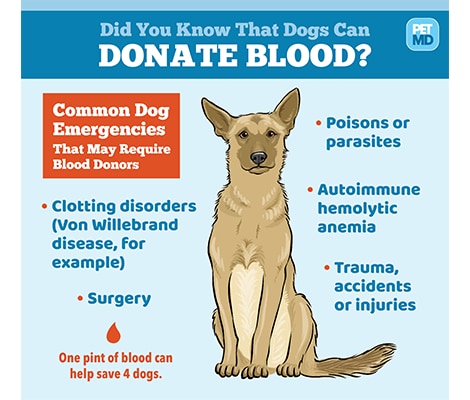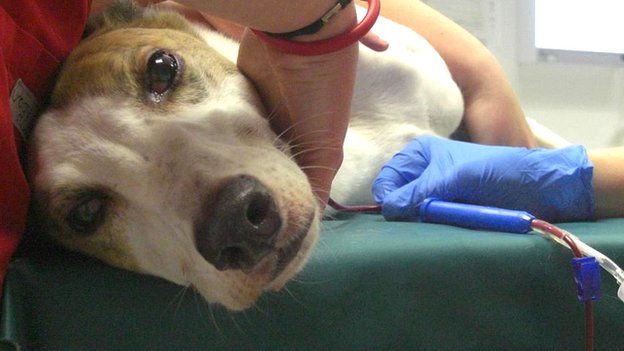Yes, dogs can donate blood just like humans, but the blood is not interchangeable between species. Dogs have the ability to save lives by donating blood, just like humans.
However, it’s important to note that the blood from dogs cannot be used for humans and vice versa. Canine blood donation plays a crucial role in veterinary medicine, as there are specific requirements that each dog must meet before becoming a donor.
Not every dog is eligible to donate blood, and it is crucial for the safety of both the donor and the recipient that these requirements are met. We will explore the process of canine blood donation, the benefits, and the potential side effects. So, let’s delve into the world of canine blood donation and how our furry companions can make a difference in saving lives.

Credit: www.ovrs.com
Can Dogs Donate Blood?
Yes, just like humans, our canine companions can also donate blood. However, it’s important to note that all blood isn’t the same, and there are many differences between species. This means that human blood cannot be given to pets. In fact, the first successful recorded blood donation was not human-to-human, but was dog-to-dog.
History Of Canine Blood Donation
The history of canine blood donation dates back to the early days of veterinary medicine. The practice of blood transfusion in animals was first documented in the late 1600s. Since then, veterinary professionals have made tremendous advancements in understanding blood types and compatibility in dogs.
Requirements For Donor Dogs
In order for dogs to be eligible to donate blood, they must meet certain requirements. For example, Midwest Animal Blood Services requires that donor dogs be healthy, friendly, and weigh more than fifty pounds. They should also be between one and seven years old, current on vaccinations, and free of parasites.
It’s important to note that dogs must undergo a thorough screening process before being accepted as blood donors. This includes blood typing and testing for infectious diseases. Additionally, donor dogs must be willing and cooperative during the blood collection process.
There are minimal risks to the donor, and most dogs suffer no ill effects from donating blood. Occasionally, donors may feel a little tired or nauseous within a couple of hours after donating, similar to how humans can feel after donating blood.
Overall, canine blood donation plays a vital role in saving the lives of other dogs in need. It is a selfless act that can make a significant difference in the veterinary field.

Credit: www.petmd.com
Blood Compatibility
When it comes to blood donation, compatibility plays a crucial role. Just like humans, our furry companions can also donate blood, but it’s important to understand the concept of blood compatibility in canines. Can your dog donate blood? Let’s explore the fascinating world of canine blood groups and universal donor dogs.
Canine Blood Groups
Just like humans, dogs have different blood groups. These blood groups are categorized based on specific antigens found on the surface of red blood cells. The most common blood group systems in dogs are the DEA (Dog Erythrocyte Antigen) and Dal (Dalmatian) systems. Within these systems, there are different blood types, such as DEA 1.1, DEA 1.2, DEA 3, and Dal N. Blood typing is essential before a transfusion to ensure compatibility between the donor and recipient.
Universal Donor Dogs
Some dogs are considered universal donors, similar to O-negative blood type in humans. These dogs have a specific blood type that is compatible with any other blood type. In the DEA system, DEA 1.1-negative dogs are considered universal donors. These dogs can safely donate blood to any dog in need without the risk of an adverse transfusion reaction.
Universal donor dogs play a critical role in veterinary transfusion medicine. Their blood can be a lifeline for dogs with unknown blood types or during emergencies where time is of the essence. If your dog is a universal donor, you can consider enrolling them in a blood donation program to help save the lives of other dogs in need.
In conclusion, blood compatibility is a vital aspect of canine blood donation. Understanding the different blood groups and the concept of universal donor dogs can help ensure safe and successful transfusions for our beloved pets. If your dog meets the criteria and you are eager to make a difference, consider donating their blood and giving another dog a chance at a healthier life.
Side Effects And Risks
When it comes to dog blood donation, it’s important to understand the potential side effects and risks involved. While there are minimal risks to donor dogs, it’s still crucial to be aware of the possible effects they may experience.
Minimal Risks To Donor Dogs
Donating blood is generally safe for dogs, and most dogs do not suffer any ill effects. However, it’s important to note that there are some risks involved, albeit minimal. Donor dogs may feel tired and nauseous for a few hours after the donation process, much like humans can feel after donating blood.
These minimal risks are outweighed by the potential life-saving impact that canine blood donation can have. It can make a significant difference in the lives of other dogs who require blood transfusions due to illness, injury, or surgery.
Possible Side Effects
While most dogs do not experience any significant side effects from blood donation, it’s crucial to observe them closely and monitor for any adverse reactions. Some dogs may be more sensitive and could exhibit the following side effects:
- Increased sleepiness or lethargy
- Mild nausea or vomiting
- Dizziness or weakness
- Temporary decrease in appetite
If any of these side effects persist or worsen, it’s essential to consult with a veterinarian. They will be able to assess the situation and provide appropriate care if needed.
It’s also worth noting that reputable blood donation organizations carefully manage their services based on blood type. Dogs with negative blood types, such as Rh-negative, are particularly sought after for donation as they can be universal donors. Managing the blood type ensures compatibility with any prospective recipient’s blood, minimizing risks even further.
Overall, while there are minimal risks and possible side effects associated with dog blood donation, the positive impact it can have on other dogs’ lives makes it a worthwhile endeavor. Donating blood can save lives and contribute to the veterinary community’s efforts in providing critical care when needed.

Credit: www.bbc.com
Process And Management
Yes, your dog can donate blood just like humans. However, it’s important to note that not all blood is the same, and there are differences between species, so human blood cannot be given to pets. The first successful recorded blood donation was actually dog-to-dog.
Blood Type Management
One important aspect of the process and management of canine blood donation is blood type management. Just like humans, dogs have different blood types, and it is essential to match the blood type of the donor dog with that of the recipient. Blood from dogs belonging to the universal donor group is compatible with any prospective recipient’s blood –AKC Canine Health Foundation. Therefore, when registering donor dogs, it is crucial to determine their blood type to ensure successful transfusions. This information enables veterinarians to provide a quicker response in emergency situations where time is of the essence.Registering Donor Dogs
To maintain a steady supply of donor blood, it is imperative to register donor dogs. These dogs are carefully managed based on their blood type, ensuring that the right blood is available for transfusion when needed. The registration process typically involves a thorough health check of the dog to ensure they meet the requirements –Pet Blood Bank UK. For example, Midwest Animal Blood Services requires that the donor dog be healthy, friendly, weigh more than fifty pounds, be between one and seven years old, be current on vaccinations, and free of parasites –Petfinder. This careful selection process guarantees that the donor dogs are in the best possible health condition to donate blood and minimizes any risks associated with the procedure. In conclusion, blood type management and registering donor dogs are crucial components of the process and management of canine blood donation. Determining the blood type of donor dogs ensures compatibility with potential recipients, providing a better chance for successful transfusions. Registering donor dogs, following strict health requirements, ensures the availability of suitable donors when emergencies arise, ultimately saving precious canine lives.Benefits And Limitations
Just like humans, dogs can also donate blood. However, not all dogs are eligible to be donors as there are specific requirements they must meet, such as being healthy, friendly, and of a certain weight and age range. It is important to note that human blood cannot be given to pets due to species differences.
Helping Save Lives
When it comes to saving lives, dogs can play a crucial role by donating blood just like humans. Blood donation in dogs has been successfully practiced and has been a lifesaver in many critical situations. This selfless act of canine blood donation can help other dogs in need of a blood transfusion due to various medical conditions or injuries.
Not All Dogs Can Donate
While the concept of dogs donating blood is noble, it is important to note that not all dogs are suitable candidates for donation. Certain requirements must be met to ensure the safety and well-being of the donor dog. Dogs usually need to be healthy, friendly, weigh over fifty pounds, be between one and seven years old, up to date on vaccinations, and free of parasites.
Moreover, dogs with certain health conditions or those on medication may not be eligible to donate blood. It is crucial for the donating dog to be in good overall health to minimize any risks or adverse effects associated with blood donation.
The risk and side effects associated with canine blood donation are minimal. Most dogs experience no ill effects and recover quickly. However, some dogs may feel tired or experience slight nausea within a couple of hours after donation, similar to how people can feel after donating blood.
Conclusion
Canine blood donation is undoubtedly a selfless act that can save lives and provide much-needed assistance to other dogs. However, it is essential to consider the individual dog’s health, suitability, and eligibility before deciding to proceed with blood donation. Consulting a veterinarian and following the requirements of a reputable blood donation organization is vital to ensure the safety and well-being of both the donor and recipient dogs.
Frequently Asked Questions On Can Your Dog Donate Blood?
Can A Dog Donate Blood To A Human?
Yes, dogs can donate blood to humans just like humans can donate blood to other humans. However, human blood cannot be given to dogs due to species differences. The first successful recorded blood donation was actually dog-to-dog. Dogs that meet the requirements of being healthy, friendly, current on vaccinations, and free of parasites can donate blood with minimal risks and no ill effects.
When Can Dogs Start Donating Blood?
Dogs can start donating blood between the ages of one and seven, as long as they are healthy, friendly, weigh over fifty pounds, up to date on vaccinations, and parasite-free. There are minimal risks involved, and most dogs experience no ill effects.
Are Dogs Universal Blood Donors?
Yes, dogs can donate blood just like humans. However, not all blood is the same and there are differences between species. Human blood cannot be given to pets. In fact, the first successful recorded blood donation was dog-to-dog. Dogs can be universal blood donors.
Are There Side Effects To Donating Dog Blood?
Donating dog blood has minimal risks, and most dogs experience no ill effects. Occasionally, donors may feel tired and nauseous after donating, similar to human blood donors.
Conclusion
Canine blood donation is not only possible but also lifesaving. Just like humans, dogs can donate blood to help save the lives of other animals in need. It is important to note that not every dog can be a blood donor, as there are specific requirements that must be met.
However, for those dogs who are eligible, the risks are minimal and the benefits are immeasurable. By donating blood, your dog can be a true hero and make a difference in the lives of others.
